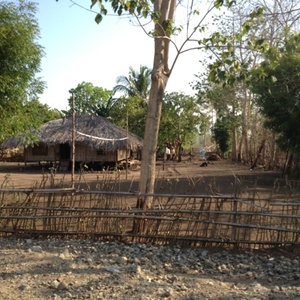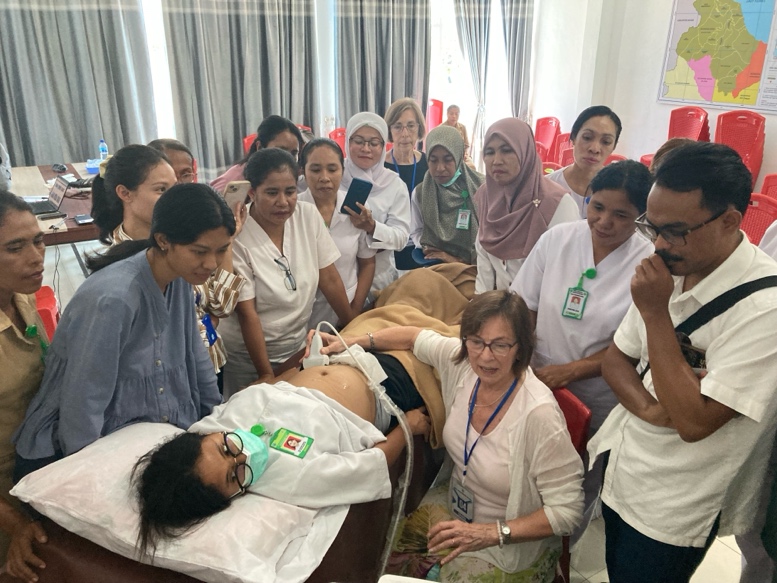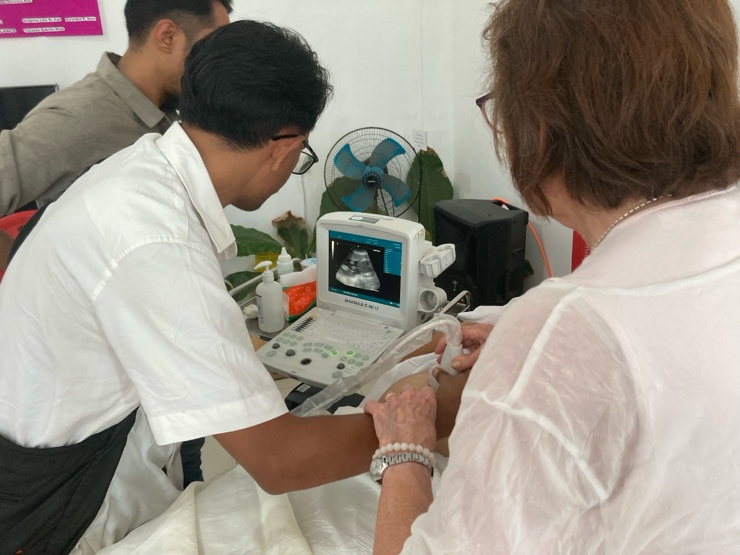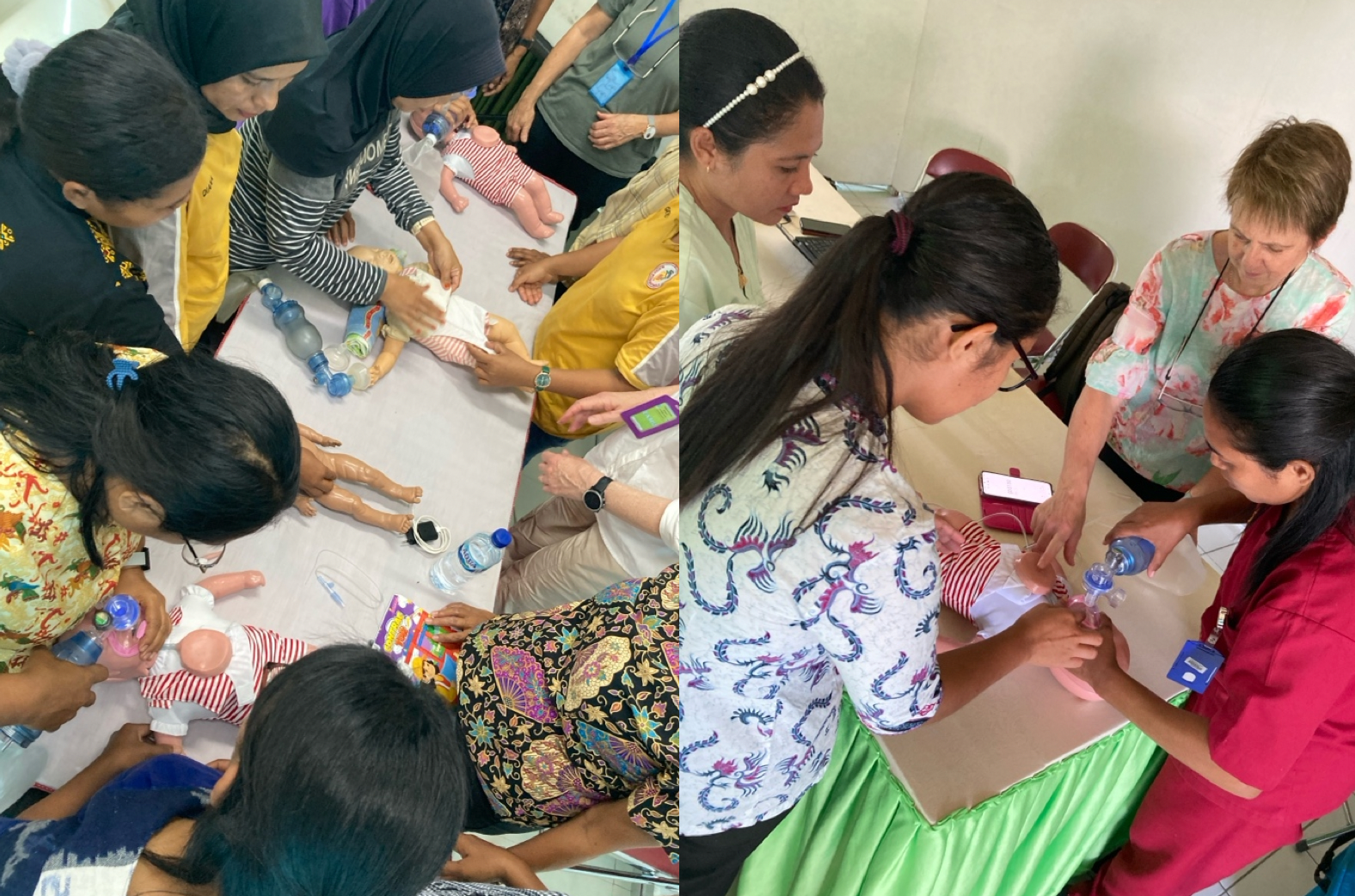Maternal and Neonatal Health (MNH) Trip June 2024

In June 2024, a FOHG Maternal and Neonatal team travelled to the District of Nagakeo on the island of Flores, Indonesia to provide skills transfer to current health staff. Nagakeo district is roughly in the middle of the island, spanning the centre with coastlines to the south and the north. The terrain is tropical near the coast, but dry and mountainous in the interior. There is a new hospital at the main town MBay, but is not fully equipped. The nearest large hospitals are Ende on the south eastern coast and Labuan Baja on the far western coast, both hours of travel on poor roads.
Team FOHG were invited to visit Nagakeo in 2012 to provide MNH training modules the same as they had been providing to staff at Ende hospital. Prior to the pandemic in 2019, health staff, doctors, nurses and midwives in Nagakeo had undergone modules covering the MNH topics. However, staff had changed and much of the training had been utilised through ‘word of mouth’ to their counterparts.

Nagakeo has many small remote clinics all over the district requiring team FOHG to travel to the staff instead of the staff visiting FOHG in a central place. Travel would take midwives too far from their isolated pregnant clients should they go into labour.
Therefore, team FOHG consisting of 3 midwives, Alison, Emily and Helen and an ultra-sonographer Sue, travelled daily from clinic to clinic facilitating training in MBay and four community clinics throughout the district including Jawakisa, Boawae, Kaburea and Nangaroro.

There were approximately 16 – 22 participants attending each day, at each clinic including 2 - 3 doctors. Approximately one hundred participants overall.
The objectives of the trip were to work with the health staff and for them to;
- identify post-partum haemhorrage and demonstrate the skills to manage it,
- update staff in neonatal resuscitation procedures and practice skills transfer,
- introduce the aim and principles of ultrasound (US),
- practice basic US transducer use and
- identify a live fetus (or fetal death).
Only a few people speak English in this remote district. Pak Nus, our team member and interpreter was invaluable. We ran at least three stations of skills and he was working between these all day to keep up with the momentum.
The Government policy preventing birthing in the villages and diverting them to the puskesmas where they get trained care, has improved MNH dramatically. FOHG has always reinforced antenatal care and following this law, each woman has a blood test for anaemia in each trimester and all receive an US at least once in a pregnancy. Midwives are still not officially permitted to do US for diagnostics but can do US to detect or investigate a suspected fetal death.
Each puskesmas has basic Ultrasound equipment but the skills of doctors is variable across the puskesmas, and it was clear the training was very useful to them as well as the midwives who had not experienced any education in US to date.


Prior to our visit the clinics did not have adequate resus dolls. FOHG presented each puskesmas visited with a new doll.

Whilst most staff understood the principles of keeping the newborn warm, of stimulation and breathing for newborns, most were unfamiliar with good ventilation technique and very few with performing cardiac compressions. The team found it very rewarding to be able to assist with these skills.

Of particular interest was the news that there had been no neonatal deaths in the last few years in Nagakeo. An anecdote was provided that reinforced the value of the FOHG program. One midwife had an experience with a newborn with a very poor APGAR1 who failed to breathe at birth. She persisted for some time re breathing the baby with a bag and mask as she had been taught. The baby survived.
1 A test denoting the baby’s Appearance, Pulse, Grimace, Activity and Respiration (APGAR).

Overall, approximately one hundred health staff attended the training during an exhausting but gratifying week for Team FOHG. We look forward to following up the basics of US in March next year, with a week designated for US training.
Dr Helen Bradley,
Maternal and Neonatal Health Team.